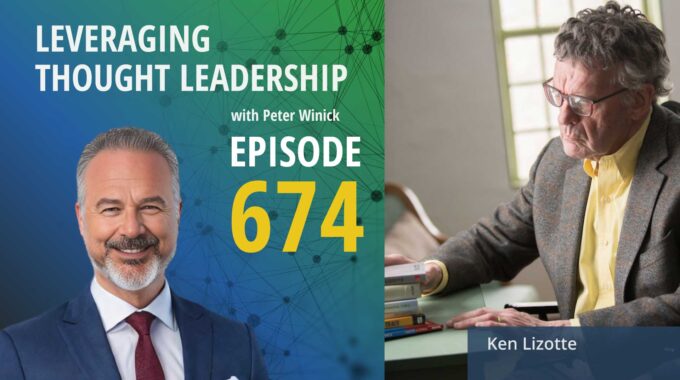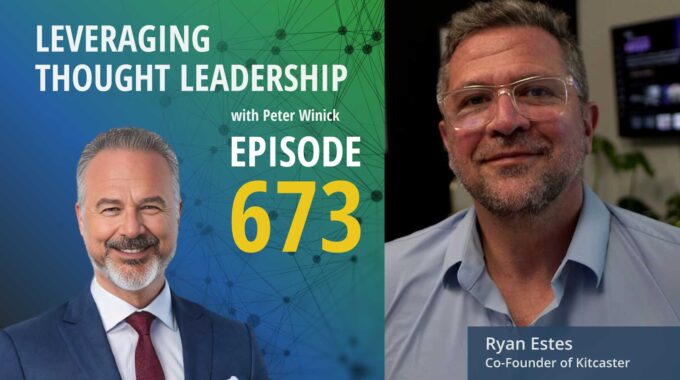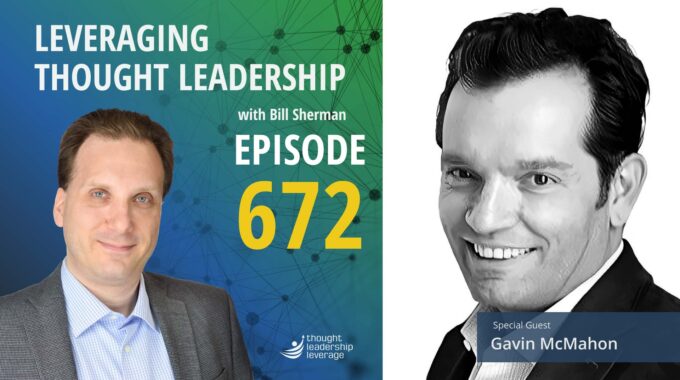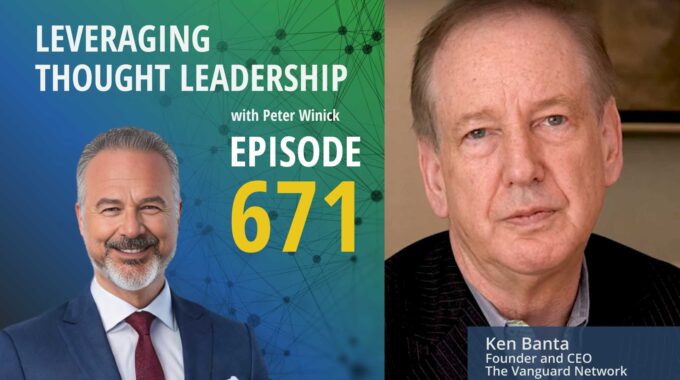Why Great Thought Leaders Don’t Play the Publisher’s Game Peter talks with publishing expert Ken…
Leveraging Thought Leadership With Peter Winick – Episode 43 – Patricia Fripp
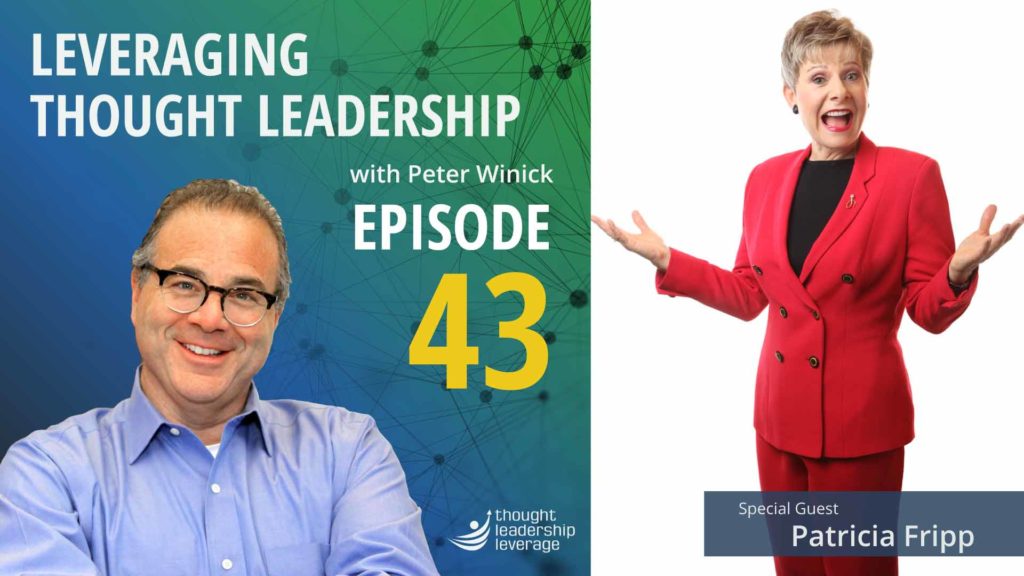
Forty years ago, professional speakers only needed one good speech. But in our modern world of global technology, companies expect a keynote to be customized for their needs. So, how can you take a sixty-minute keynote and keep it constantly fresh?
Patricia Fripp, Certified Speaking Professional, former President of the National Speakers Association, and creator of FrippVT, is our guest this week. Listen in as Patricia joins Peter to share her experiences in the speakers’ market, and how client expectations have changed over the years.
Patricia also offers some great advice for taking your speaking ability into the virtual realm, and why speakers must be excellent listeners.
Test your listening skills and tune in!
If you need a strategy to bring your thought leadership to market, Thought Leadership Leverage can assist you! Contact us for more information. In addition, we can help you implement marketing, research, and sales. Let us help you so you can devote yourself to what you do best.
Transcript
Peter Winick And welcome, welcome, welcome. This is Peter Winick. I’m the founder and CEO of Thought Leadership Leverage. And you’re joining us on our podcast today, which is Leveraging Thought Leadership. My guest today, and I’m really excited about today, is Patricia Fripp. Patricia has written a ton of books. She has been a speaker and she’s a CSP CPAE Hall of Fame speaker. She was the first female president of the NSA and that’s the National Speakers Association, which has over 3,500 members. She’s been a member of the Speaker’s Roundtable. We can go on and on and spend our entire time today talking about the coaching that she does and the training that she does and keynotes that she does, but let’s just dive right in. So first off, welcome, Patricia, and thank you so much for joining us today.
Patricia Fripp Well, my pleasure, Peter, I appreciate the invitation.
Peter Winick and I’m glad to have you. So, as someone who has been at this for a while, let’s say, and you’ve spoken, I would imagine, probably almost every continent, probably except Antarctica by now.
Patricia Fripp Well, five continents, not Antarctica, over 3,000 times.
Peter Winick Okay, so not your first day at the races, so let’s start with what is different today about that world and what’s the same.
Patricia Fripp Well, if you look back as a 42-year member of the National Speakers Association, when I first set the goal to become a professional speaker, the industry was a lot smaller, expectations were very different. Companies, and I think back to companies like Nationwide insurance, for example. Well, a new, newly successful speaker, but certainly not a celebrity, I got off stage and the meeting planner said, what Friday in August next year would you like to be in Orlando? We’ll build the program around June. Now, that would not happen today. That probably wouldn’t even happen for a celebrity speaker. And also we, practically we couldn’t, promote through email, LinkedIn, websites, Facebook, because they didn’t exist yet. So things are very different. So one, the market is larger, the amount of people who want to be professional speakers has increased.
Peter Winick So let me question that. So the market is larger. That’s a positive if I’m going into that marketplace, but because that’s the demand side, has the supply grown faster then or at the same rate as the demand? Because it seems like everywhere I go, every third person I talk to is a speaker today.
Patricia Fripp Exactly. And the other two want to be. However, the clients, their expectations are greater. 40 years ago, if you were good, you could give the same speech every time. Now they really want, they want it personalized and customized to them. And also, and this is, I’m quoting Brian Palmer of the National Speakers Bureau. He said, now. The bean counters are part of the programming of conferences.
Peter Winick Which is never a good sign if you’re on the supply side.
Patricia Fripp No, because you have to. OK, well, you know, Jeanne Robertson’s the best humorist in the country. Yes, and what is the financial implication for this conference if we invite her? Which I don’t think happened, well, it didn’t happen even 20 years ago.
Peter Winick So let me ask you that, if the market’s asking, which is a great question, the old question was, I’ve seen her, she’s good, she great, she entertaining, she’s engaging, I’ve read her book, all great questions and a good speaker can answer those, how do I justify or how do we even attempt to answer the question of, what’s the ROI of your keynote? That’s a tough one.
Patricia Fripp It really is, depending on your topic, I think someone like Dan Burris, who’s a futurist, for example, could probably find a good case. If you are in sales and you have a good track record of what your clients have done, you could probably do it.
Peter Winick But if I’m in leadership or innovation or collaboration, or because most people aren’t futurists and sales, I understand, sales there should be, but exclusive of sales and making predictions on the future based on obvious business trends, how might the rest of the folks answer that question?
Patricia Fripp you might even change the subject to it’s not so much well you would ask questions rather than make the case you would asked questions so you might say in the audience what would it be worth to your company if they could be 10 more productive in this area if through the ideas presented see it’s a keynote in itself introduces ideas at a higher level of abstraction and it is more difficult to justify the outcome. This is why my entire career I have always, whenever I deliver a keynote, always offered to do multiple breakouts. In fact, some conventions I deliver keynote and five breakout sessions when you can go really deeper into the subject.
Peter Winick So that’s a great point because I think there is a difference, you know, at the end of the day, a 60 minute keynote, if that’s all the stage time that you have is limited right in terms of, you know, what can we do with anyone in 60 minutes, right? So we can make them aware of a new concept. We can be entertaining, we can be engaging. We can throw out some concepts for them to think about, but I don’t think it’s fair to be held to the standard of. we will change the behaviors of those people based on a 60 minute interaction that are connected to a measurable business outcome, right? That’s kind of a high bar, but what you’re talking about is expanding speaking to workshops and I know you do digital training and sort of those sort of things. That’s a different game and a different set of expectations. Would you agree with that?
Patricia Fripp I definitely would, and as a 42 year member of the National Speakers Association, if you want to consider yourself an expert or a thought leader, because obviously many people come to me for advice to different areas of their speaking, what we have to do is have an expertise and deliver it to clients the way they want it. For example, I built my speaking career as a keynote speaker speaking at conferences and whenever possible, adding the extra breakout session. However, out of that, by listening to my clients, and it doesn’t matter what industry you’re in, you have to listen to your clients and they will tell you the direction that your business will go. For example I remember the first time I was picking up my keynote fee and I had an audience of six people. there to help them improve their sales conversations and presentations. Another time when I spoken at a national sales meeting and the national sales manager came up and said, Patricia, I like your speech, but I loved how you delivered it. Can you teach our sales people how to do that? because it takes us a year. to be in a position to deliver a one-hour presentation to a hospital group. And it’s worth $9 million a year if we get the business and we are losing sales and it has nothing to do with our price or our offering. It has to do with the fact that the presentation skills of our competitors are better than ours. Can you design the program? And little did I know when I responded to her request that she had just given me the key to always be in demand. And it would be, although I’m holding it together pretty well, it would be unrealistic to think that I look as good on iMag as I did 20 years ago.
Peter Winick Yes.
Patricia Fripp I see my old video clips and think I’m so gorgeous in that clip. It is depressing but the point is the Expertise that I’ve had the opportunity develop in the last 40 years, you know people say what’s the best part about being a speaker? It is the education of learning about different industries and companies and have access to the type of individuals that we might not meet We certainly might not meet socially, so it’s the education.
Peter Winick Well, but, but it’s not just the education for the sake of acquiring knowledge or an awareness of how a certain industry works or how it doesn’t work. You’re getting the best type of education, meaning they’re giving you insight as to what you can do to better serve them, and then you’re responding to it. So to me, that’s beautiful, right? If you can get up and speak and your, your keynotes on X, but they say, you know what, Patricia, you’re actually quite good at this and we need help. I think a lot of speakers position themselves in such a way where it’s a monolog and not a dialog. I’m the expert. I’m going to blah, blah, tell you about my model and methodology, and then I’m off and I’m gonna go fly to Orlando. My instincts are you’re still a very good listener and still gaining intelligence from the marketplace. Could you tell me how you embed in your interactions with your clients processes and such to be able to get them to share with you what they want?
Patricia Fripp I’m not sure if you’re aware of what my profession was before I launched into my speaking career. I was San Francisco’s number one men’s hairstylist when it was a new industry. And so I talked to 16 business men, because I was just a men’s hair stylist, six business men a day. I was solidly booked for 15 years. And so I won. got very comfortable talking to a very successful individual and asking them about their business. You know, what made you the best salesperson in your company? What did you do that a big company wanted to pay you billions of dollars for your little company? So I got an education, but also my brother is always saying, sister, you interrogate people. I said, no, I’m genuinely interested. And it’s amazing, asking what my brother, because we are British after all, would consider his personal questions. People love talking about themselves and their expertise.
Peter Winick particularly if you’re trapped in a chair with someone with a razor or a sharp object in their hands, right?
Patricia Fripp But, you know, it’s amazing. So I’ll give you a specific example. I spoke at a very prestigious speech writers conference, and these audience, these were people who write the speeches for CEOs of Fortune 100 companies and politicians. And because you often have, I remember one time, one of the other keynotes, the three guys who write Clinton’s speeches, President Clinton, and for example I’m doing another in the fall and Tony Blair’s top speechwriter is going to be on the program. So you know these are the type of caliber of people you make. But anyway one head of communications for a Fortune 100 company said Patricia you know my boss just got promoted I want to talk I want, to set up a three-way call so you can talk to him about how you can help him with this big big big presentation he’s giving. And so the three of us, it was John, the Head of Communications, and Brian, the executive, and me. And so John said, can you tell Brian how you work with executives? And I ignored the question. I said, Brian, congratulations on turning your last division around. I understand it’s because of that success that you got this promotion. If I may ask, how did you do that? So he said, oh, it was a five-step process. And 25 minutes later, I said, that is absolutely brilliant and word perfect. I assume what you just said is the foundation of your speech. So what I would say to you, Peter, is I am smart enough to know that most of my executive clients have more brains in their little finger than I have in my… higher body, however, my superpower, which is honed over 40 years, is to listen to what executives say and either immediately put that into a framework of a presentation they would give, or I listen to, say, their opening of the presentation and almost instantaneously said, that’s good, but why don’t you say it this way, and they almost gasped. It’s just whatever our particular expertise is. You know, I say, look, I don’t know your business. I’ve just spent years focusing on this aspect of how do you get your message across. It’s amazing being a good listener and obviously, which partly from my past profession, people tell me I know what they would never tell anybody else. And they often say, I cannot believe I’m telling you this. My wife doesn’t know this, but it’s a certain, because this is why with executive speech coaching, you can’t hire me until we’ve had a conversation. Because one, it’s not only the expertise that you might have, it’s the rapport that you have with people.
Peter Winick Let me compare and contrast that with another side of your business, right? So to be someone’s executive speech coach, there’s a level of trust. So forget the skill for a moment, trust, rapport, personality. It’s an intimate relationship. So there’s, there a bunch of intangible things, chemistry, whatever, you know, that have to click or not click some of them within your control and some without, right. So sometimes somebody, whatever they walk in and they, they, you know, they don’t like someone named Patricia because it reminds them of their second grade history teacher. Okay, well. I’m not going to overcome that. And that’s a very customized, personal experience. Let me flip to the other side of your business, which is the virtual training. So by definition, the most unpersonal. So you have a digital training system and a scalable technology there that teaches people, I would argue, many of the same things that you’re teaching your coaching clients in an intimate setting. How do you take the same content and put it on both sides of the spectrum?
Patricia Fripp Well, when you do it well, it is a very personal aspect because although in Fripp Virtual Training, Fripp VT, it’s all prerecorded. And again, through years of doing this, most speakers can’t look into a camera and talk for hours. They can’t do it. They want to look around for an audience. But having been familiar with it, And the way you write your content, because it’s all scripted because of the editing, you’re looking into a camera, into a teleprompter and reading it. But when you write it conversationally, I would maintain, although it isn’t you in person, it is, when you do this well, it exudes your personality. And I know the way the system is designed. because you have to interact. You have to answer questions. It’s almost like, how did she know I was thinking that? Because it’s a well-designed system. So if you know how to work with a camera and if you how to write a script conversationally, I would say they’d say, Fripp, I’ve seen you in person. It’s just like having you there.
Peter Winick Got it. So let me go to the other side of that. The buyer, the pricing, two very different markets, right? Because if I’m hiring you to work with me directly, that’s gonna be quite expensive, relatively speaking, right. If I’m a sales leader and I say, wow, she’s a game changer. We brought her in for our keynote. She coached me personally. My results went through the roof. But I’ve got, you know, whatever, 800 people on the team. There aren’t 800, you, there aren’t hours in the day or days in the month or whatever to have you, even if budget wasn’t an issue for the team, How do you basically take sort of the same content at different ends of the price spectrum?
Patricia Fripp Well, of course, and this is why more and more companies demand from their vendors, we need at least part of your training has to be online because our salespeople are all over the world or engineers are all over the word, we are never going to get them together. And so this is my online. Now, if it’s an individual, I say, look, for less than one hour of my coaching. you can have access to my Fripp VT for a year. So if you just go through the core, how to structure, how to open, how to connect your audience, how you find content, how do you get specific, how do open with impact, how do tell stories, go through that and then our more expensive time will be shortened. So that works very well. It’s a money, but with a large company, the more people you have, the less it costs. And what we always do with all our clients, we will deliver a, and we record it, but it’s a kickoff session. Where one, I take their content. So have our sales people or our engineers or whoever have to deliver. So I hear a sample of their presentations. I’m familiar with the conversations they have.
Peter Winick So you’re putting a custom front end bumper or something on it. So it’s not just, yeah.
Patricia Fripp Exactly a custom front-end and then show them how to use the system and because there’s testing tracking and monitoring The managers can see who’s taking it And then I will build in as long as people are active I’m happy every through it, you know every three months do another session or I love it different offices So it can be customized and very personalized so they example, they get me, but it’s going to be more in Zoom. It’s not going to be in person because, and I mean, even have companies, you know, Fortune 100 companies, they have a budget won’t match it. Can you do it online?
Peter Winick So it allows you to scale. It allows you touch more people. It allows to make more money. Answer this for me, because I have a feeling you’re gonna answer it the way I would. One of the things I hear from folks is, oh, but if you could buy me for whatever, couple hundred dollars a year on a subscription basis, why would you pay me tens of thousands? It has to cannibalize the business. Tell me, give me your take on that from the field.
Patricia Fripp My approach is it adds to it does not subtract. You know, one of my biggest clients, I mean, big clients, I train over a hundred engineers twice a year in Zoom, go on location. I’m only just infiltrating with my Fripp VT. Yet I have other companies, I’m getting ready for one right now. It’s two days of in-person training, It’s a kickoff webinar next week. to prepare them. It’s two days of training and then a year of repetition and reinforcement for VT. That’s ideal.
Peter Winick So it’s a bundled solution where there’s a place for you personally and a place for both, and it’s that right mix of learning. So for you, it’s actually obviously been a win as it should be for most if done well. And I think what I was going to ask, oftentimes it also gives you another door, meaning another way to come in. Right. So if somebody’s on video, it’s low risk way for a client to sort of experiment with you. Maybe one person, maybe 20 people, maybe 30, whatever. They see it, they like it, and it generates demand up the food chain. And then I’m sure you have clients that started with a couple of people on video and now keynoting and doing an integrated learning journeys that might last a year. Is that, is that
Patricia Fripp That’s accurate. It works both ways. And of course, for me, I have a lot of fans, whether they’re speakers, toastmasters, or that they’re familiar with me, that they could never have. And realistically, they wouldn’t. I’m not going to take someone’s money if they can’t get it back. In other words, oh, I want to be a famous speaker. Well, chances are you’re not going Thank you. Until we get you closer there, you don’t want to pay someone like me $10,000 to build a speech that you don t know how to mark.
Peter Winick Right. So it’s, it’s a risk management piece. So they can build up to that. If they, if they actually take the learning that’s in the video, apply it, do some things. Now they’ve managed the risk and know it’s worth the investment in, you know, whatever it is, $10,000 to write a speech because there’s a market for it. So that’s great. Let me, um, as we’re starting to run out of time here, I could, I could talk to you for hours cause this is great stuff. What would you advise someone that’s been in the, in the NSA somewhere between let’s say 42 years and two years? that has not crossed over, and when I mean crossed over moved from having their entire business be based on them getting paid to do stuff to transforming that business into one where that is but one leg in the stool to have a more robust, you know, blended digital, non-digital enterprise. What should they look out for? What should consider traps to avoid? What would you, how would you counsel them? And by the way, we’re getting thousands of dollars worth of amazing insight from you, which I appreciate on behalf of everyone.
Patricia Fripp Okay, well, let’s start at the beginning. At the beginning, you will be overwhelmed, and I’m sure this is true in any industry, you’re overwhelmed with what there is to do, and so many people telling you, you must do this. You cannot do it all, so hand pick what it is you’re gonna focus on. So for example, rather than having Facebook lives every week, I would much rather you build a website or develop a blog. That will have greater impact than just the people, you know, so you have to have an online presence Yes, I wouldn’t at the beginning of your career focus on you know. What is your niche? What is you target audience? I said anyone who will pay you is your market at the begin it but however develop a certain Expertise and the moment you realize I have expertise and whether I deliver this to one person as a coach or consultant, whether I delivered to 50 people as an all-day or two-day training program, whether I deliver online or whether I delivery as a keynote, this is my expertise because there are celebrity keynotes that do nothing else. However, I can most. real working speakers, especially for 40 years, you have to be able to deliver your content in however the clients want to buy it. Have a balanced business, but at the beginning, develop your expertise and you will find the market, you’ll know where you belong more. You just have to trust the process. And then when you… find yourself in an industry, what you need to do is maximize it. For example, believe it or not, at a certain part of my career, for many years, I was an expert in death kit, as in cemeteries, funerals, cremations.
Peter Winick I guess, does that come in handy anymore in terms of trivia? Because it seems like an interesting.
Patricia Fripp Well, I could go back into the industry and personalize. Also, I was an expert in manufactured housing. Huh, OK. Because what do you do? I get booked. I get book for an engagement. And they say, oh, we don’t need to be an industry expert. We just need you to give your normal motivational speech. This was a long time ago where they didn’t. However, what did I do? I took a day of my life and I went out and pretended to be a mystery shop. And it is amazing, you go to seven locations of the industry you’re in and you take notes and you build within your keynote your experience. It’s amazing how fast you’re considered an industry expert. You read their magazines and publications and always ask yourself, what does this that they’re writing about remind me of in my content. so you add personalized stories and examples and you sit in their sessions, their breakout sessions, industry experts, you make friends and you interview them so you know what’s the highlights of what they know plus your expertise plus your mystery shopper and you can be an expert in that industry.
Peter Winick Well, that’s incredibly well said and timeless information, right? So much easier to do that today with a web search than it would have been 25 years ago, going to annual reports and all that sort of stuff. As we get to wrap here, Patricia, if you could briefly just tell folks where to find you, how do they find you and get in touch with you? Because hoping that more folks will want to talk to you after this, as they have been for a long time.
Patricia Fripp Well certainly, I would go to my website, frip.com, you can find about FRIP, VT, coaching speeches, anything, have plenty of, over a thousand blog articles about speaking. And if anyone wants to send me a specific question to pfripp at fripp, f-r-i-p-p dot com, I will answer your email.
Peter Winick Well, thank you so much, so much wisdom into a half an hour here and experience and most importantly, practical things that you can do today to emulate some of the success that Patricia’s had for a long, long time. I appreciate your time and I thank you for spending it with us this afternoon and sharing your insight. Thank you so.
Patricia Fripp Thank you, my pleasure, and remember, think big, start small.
Peter Winick To learn more about Thought Leadership Leverage, please visit our website at ThoughtLeadershipLeverage.com. To reach me directly, feel free to email me at peter at Thought Leadership leverage.com and please subscribe to Leveraging Thought Leadership on iTunes or your favorite podcast app to get your weekly episode automatically.


